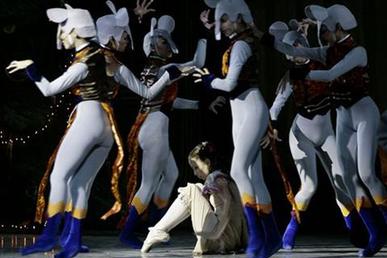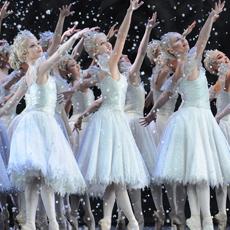
DOUG JOHNSON: I'm Doug Johnson.
FAITH LAPIDUS: And I'm Faith Lapidus with EXPLORATIONS in VOA Special English. Today we enter a world of Christmas magic, snowflakes, sweets and sugar plum fairies. "The Nutcracker" is one of the most popular ballets in the world. It is also an important part of the winter holiday season in America. This week, we tell about the history of this ballet and several versions being performed throughout the United States.
(MUSIC: "March")
DOUG JOHNSON: Our story begins at the Mariinsky Theatre in St. Petersburg, Russia on December 18th, 1892. People have come to see the first performance of "The Nutcracker." Peter Ilyich Tchaikovsky wrote the music and Marius Petipa and Lev Ivanov created the ballet's dance movements.
The ballet was based on a story called "The Nutcracker and the Mouse King" by the German writer E.T.A. Hoffmann. The French writer Alexandre Dumas later rewrote Hoffman's story. The ballet is based on this version by Dumas.
FAITH LAPIDUS: Tchaikovsky did not much like the ballet or story of "The Nutcracker." He reportedly wrote to a friend that the music he was writing was far worse than the music for his earlier ballet, "The Sleeping Beauty." Many of the people watching "The Nutcracker" that night did not like the ballet either and criticized it. But others praised the ballet for its music.
DOUG JOHNSON: Tchaikovsky was one of the first major composers to use a new musical instrument called a celesta. He discovered the instrument during a visit to Paris. You can hear it in "The Dance of the Sugar Plum Fairy." It gives a special magic to this dance.
(MUSIC: "Dance of the Sugar Plum Fairy")
FAITH LAPIDUS: Tchaikovsky probably would not have believed that his ballet would one day become an international success. He did not live long enough to find out. He died in 1893 at the age of 53.

DOUG JOHNSON: In time, "The Nutcracker" was performed throughout Russia and the rest of Europe. The first performance in the United States was in 1940. The Ballet Russe de Monte Carlo performed a shorter version of it in New York City. The first full-length performance was in 1944 by the San Francisco Ballet.
The famous Russian-born ballet director George Balanchine created his own version of "The Nutcracker" for the New York City Ballet. This group has been performing the ballet every year since 1954.
Other dance companies around the United States soon followed this ballet tradition. For many dance companies "The Nutcracker" is an important part of their financial operation. Some big cities have several different productions of the popular ballet.
(MUSIC: "Grandfather's Dance")
FAITH LAPIDUS: More than any other ballet, "The Nutcracker" is about children and the wonder of childhood. For many young Americans, "The Nutcracker" is the first professional dance performance they will experience. Performances are generally filled with parents and children of all ages. Many of the dancers in the ballet are also children. And, the story is about a child.
The story of "The Nutcracker" differs with every production. But we will tell a traditional version to give you an idea of the story.
DOUG JOHNSON: The ballet begins the night before Christmas at the large house of a German couple and their two children, Clara and Fritz. The family is having a Christmas party with many guests.
(MUSIC: "Herr Drosselmeier's Gifts")
The godfather of Clara and Fritz arrives and gives them wonderful gifts. Clara receives a nutcracker, shaped like a toy soldier. But her brother breaks the nutcracker while playing with it. Clara is very sad that her beloved toy has been damaged. Later, the guests leave and everyone goes to bed.
FAITH LAPIDUS: Clara wakes up in the night to check on her injured nutcracker. The clock strikes midnight. Suddenly the room fills with large mice. The Christmas tree starts to grow and grow. Clara's nutcracker also increases in size, becoming the size of a human. He fights a battle with the mice. The toys in the room also come to life and fight as soldiers alongside the nutcracker.
(MUSIC: "Battle")
With Clara's help, the Nutcracker defeats the mouse army and kills the Mouse King. The Nutcracker then turns into a prince.
(MUSIC: "In the Pine Forest")
DOUG JOHNSON: The Nutcracker Prince leads Clara through a pine forest where snowflakes dance around them. Then, they travel to the beautiful Land of Sweets. This land is ruled by the Sugar Plum Fairy.
The Prince tells her about Clara's bravery in helping him defeat the Mouse King. The Sugar Plum Fairy rewards Clara by presenting a series of dances. These include a Spanish, Arabian, Chinese and Russian dance.
(MUSIC: "Russian Dance")
After the celebration, the Sugar Plum Fairy and the Prince do a beautiful dance for two, or a pas de deux.
(MUSIC- "Pas de Deux")
Clara falls asleep. When she wakes up, she is in her house by the Christmas tree with the toy nutcracker in her arms.
FAITH LAPIDUS: People can see many versions of "The Nutcracker" this time of year. Some are very different from the story we have described. These include a Jewish klezmer music version, a gay dance-along version and a sexy version for adults only.
New York Times reporter Alastair Macaulay has spent weeks travelling around the United States to see many different "Nutcracker" performances.
These include performances in New York City; Memphis, Tennessee; Houston, Texas, and Newport, Rhode Island. His "Nutcracker Chronicles" tell about his travels and the many versions of the ballet.
DOUG JOHNSON: For example, the New York-based Mark Morris Dance Group has redefined this ballet in its production called "The Hard Nut." It takes place in the 1970s. This modernized version is dark, funny and very imaginative.
British dance director Matthew Bourne begins his ballet "Nutcracker!" in a center for children without parents. Clara later sees her beloved Nutcracker Prince fall in love with someone else in a strange world of sugar called Sweetieland.
FAITH LAPIDUS: Many performances of "The Nutcracker" are created with the local area in mind. For example, the Tucson Regional Ballet in Arizona puts on "A Southwest Nutcracker." The production includes coyotes, chili peppers and a Mama Pinata.
Septime Webre is the artistic director of the Washington Ballet in Washington, D.C. His "Nutcracker" takes place in historical Washington. It begins in the Georgetown area of the city in 1882.
SEPTIME WEBRE: "So I thought it would be wonderful for the ballet to reflect the people who are watching the production. I always think art is most powerful when people can see themselves in the work somehow."
DOUG JOHNSON: Septime Webre says that in his version Clara dreams through time. For example, the battle scene in Act One is influenced by the American Revolution. The Nutcracker's role is based on George Washington. His opponent, the Mouse King, is British King George the Third. Act Two takes place amid Washington's famous cherry blossoms.
We asked Mr Webre what he thinks has made "The Nutcracker" ballet such a beloved production over the years.
SEPTIME WEBRE: "Well, the music absolutely is the key to its success. It's so familiar, but it is also so beautifully rendered. And, despite it being played over and over at every shopping mall in the country, it doesn't become commercial."
FAITH LAPIDUS: Septime Webre says that seeing a beautiful ballet dancer skillfully dancing to Tchaikovsky's music is to see a joy and faith in the harmony of the world. And, he says this is a message that people seek during the holiday season.
(MUSIC)
DOUG JOHNSON: This program was written and produced by Dana Demange. I'm Doug Johnson.
FAITH LAPIDUS: And I'm Faith Lapidus. Our programs are online with transcripts and MP3 files at voaspecialenglish.com. Join us again next week for EXPLORATIONS in VOA Special English. And happy holidays to everyone.
The Nutcracker:《胡桃?jiàn)A子》(芭蕾舞劇)
celesta: 鋼片琴(發(fā)出如鐘的聲音的一種有鍵的小樂(lè)器)
Before 'Black Swan,' ballet as a dance of power and influence
Russian swimmers perform underwater ballet in Wuhan
San Francisco Ballet Group performs in Shanghai
Ballet dancers pose for media in Berlin
(來(lái)源:VOA 編輯:Rosy)
